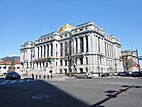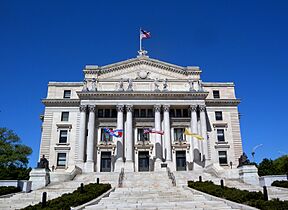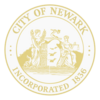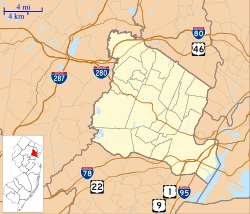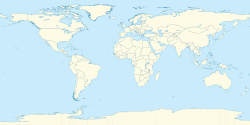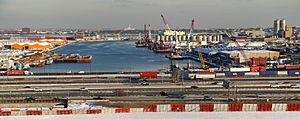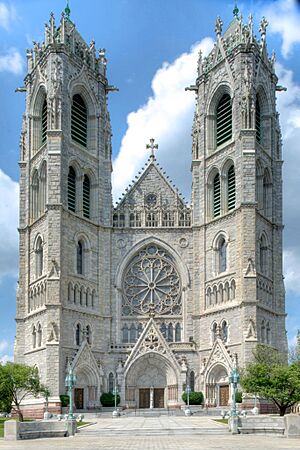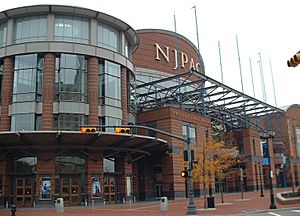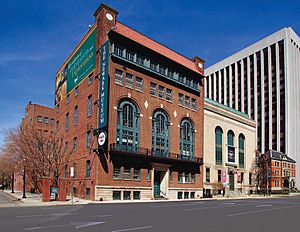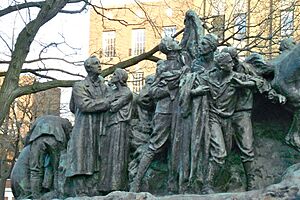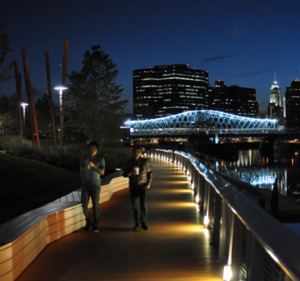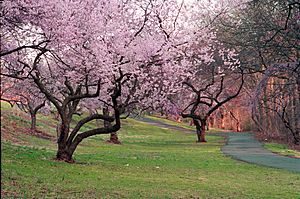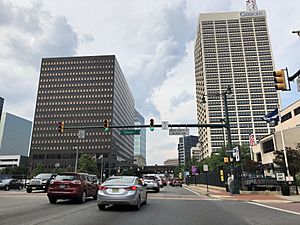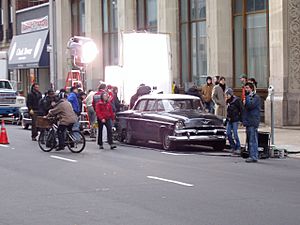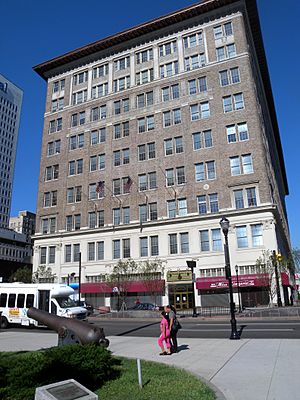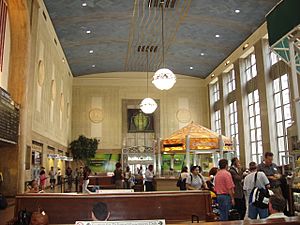Newark, New Jersey facts for kids
Quick facts for kids
Newark, New Jersey
|
|||
|---|---|---|---|
|
City
|
|||
|
|
|||
|
|||
| Nicknames:
Brick City, the Gateway City, the City by the River
|
|||
| Country | |||
| State | |||
| County | Essex | ||
| Founded | Religious colony (1663) | ||
| Township | October 31, 1693 | ||
| City | April 11, 1836 | ||
| Named for | Newark-on-Trent, Nottinghamshire, England | ||
| Government | |||
| • Type | Faulkner Act (mayor–council) | ||
| • Body | Municipal Council of Newark | ||
| Area | |||
| • Total | 25.88 sq mi (67.04 km2) | ||
| • Land | 24.14 sq mi (62.53 km2) | ||
| • Water | 1.74 sq mi (4.51 km2) 6.72% | ||
| Area rank | 102nd of 565 in state 1st of 22 in county |
||
| Elevation | 13 ft (4 m) | ||
| Population
(2020)
|
|||
| • Total | 311,549 | ||
| • Estimate
(2023)
|
304,960 | ||
| • Rank | 66th in country (as of 2022) 1st of 565 in state 1st of 22 in county |
||
| • Density | 12,903.8/sq mi (4,982.2/km2) | ||
| • Density rank | 22nd of 565 in state 4th of 22 in county |
||
| Demonym(s) | Newarker | ||
| Time zone | UTC−05:00 (Eastern (EST)) | ||
| • Summer (DST) | UTC−04:00 (Eastern (EDT)) | ||
| ZIP Codes |
07101-07108, 07112, 07114
|
||
| Area code(s) | 862/973, 201, 551, 732, 848, 908 | ||
| FIPS code | 3401351000 | ||
| GNIS feature ID | 0885317 | ||
| Website | newarknj.gov | ||
Newark (/ˈnjuːərk/ NEW-ərk) is the largest city in New Jersey. It is the main city of Essex County and a big part of the New York metropolitan area. In 2020, about 311,549 people lived there. This makes it one of the most populated cities in the United States.
Newark was started in 1666 by a group of Puritans. Its location near the Passaic River and Newark Bay has made its waterfront very important. Port Newark–Elizabeth is a major shipping port on the U.S. East Coast. Newark Liberty International Airport was the first public airport in the U.S. and is now one of the busiest.
Many companies have their main offices in Newark. These include Prudential, PSEG, and Panasonic Corporation of North America. The city is also home to several colleges and universities. These include Rutgers University, the New Jersey Institute of Technology, and Seton Hall's law school. Newark has many government offices and cultural places like the New Jersey Performing Arts Center and The Newark Museum of Art. Branch Brook Park is the oldest county park in the U.S. It has over 5,000 cherry blossom trees, the most in the country.
Newark is divided into five main areas called wards: East, West, South, North, and Central. Many Black residents live in the South, Central, and West Wards. The North and East Wards have many Latino residents. Ras Baraka has been the mayor of Newark since 2014.
Contents
- Exploring Newark's Past
- Understanding Newark's Location
- People and Cultures of Newark
- Newark's Economy and Jobs
- Arts and Culture in Newark
- Parks and Fun in Newark
- Media and Entertainment in Newark
- Sports in Newark
- Learning and Education in Newark
- Getting Around Newark
- Health and Safety in Newark
- Newark's Global Connections
- Notable people
- See also
Exploring Newark's Past
Newark was founded in 1666 by Puritans from Connecticut. They were led by Robert Treat. The town was first meant to be a religious community. On October 31, 1693, it became a New Jersey township. Newark officially became a city on April 11, 1836.
The city's name might come from Newark-on-Trent, England. This is because of the first pastor, Abraham Pierson. Some also thought it meant "New Ark" or "New-Work," referring to a new start with God.
During the American Revolutionary War, British soldiers raided the town. In the 1800s and early 1900s, Newark grew a lot with new factories and more people. Later in the 20th century, the city faced challenges. After World War II, many residents moved to the suburbs. The 1967 Newark riots also caused many people to leave.
Since the 1990s, Newark has been rebuilding. Many new offices, arts centers, and sports projects have been built. The city's population, which had gone down, has started to grow again.
Understanding Newark's Location
Newark covers about 25.89 square miles (67.04 km²). Most of this is land, with some water. It's one of the smallest major cities in the U.S. The city's height above sea level ranges from 0 feet (sea level) to about 230 feet (70 m). Newark is like a big bowl that slopes down to the Passaic River.
The marshy areas near Newark Bay were once hard to build on. But over time, land was reclaimed for the Newark Liberty International Airport and the port.
Newark is surrounded by suburbs to the west. The Passaic River and Newark Bay are to the east. Other cities are to the south and north. Newark is the biggest city in New Jersey's "Gateway Region." This is why it's sometimes called the "Gateway City."
Newark shares borders with many other towns. These include Belleville, Bloomfield, East Orange, and Elizabeth.
Exploring Newark's Neighborhoods
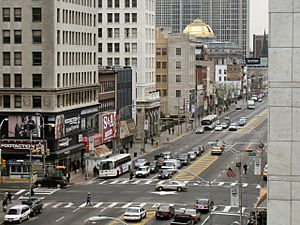
Newark is very diverse, meaning many different cultures live there. The city is divided into five main areas called wards. People often use these ward names to say where they live. But lately, people are also using smaller neighborhood names. Factories and port areas are mostly in the East and South wards. Homes are mainly in the North, Central, and West Wards.
The Central Ward has much of Newark's history. It includes old parks like Lincoln Park and Military Park. This ward is home to several universities. These include Rutgers University – Newark, New Jersey Institute of Technology, and Essex County College.
The North Ward is next to Branch Brook Park. It has neighborhoods like Broadway and Forest Hill. Forest Hill has many old mansions and historic homes. This ward used to have a "Little Italy" area. Now, many Latino families live there.
The West Ward includes neighborhoods like Vailsburg and Ivy Hill. It is home to the historic Fairmount Cemetery. This ward used to have many Irish, Polish, and Ukrainian families. Today, it has many Latino, African American, and Caribbean American residents.
The South Ward has neighborhoods like Weequahic and Clinton Hill. It used to have many Jewish residents. Now, it has many African American and Hispanic families. The city's second-largest hospital, Newark Beth Israel Medical Center, is in the South Ward.
The East Ward includes much of Downtown and the Ironbound neighborhood. The Ironbound was once a big industrial area. Today, it's known for shopping, dining, and nightlife. It's often called "Little Portugal" or "Little Brazil" because of its large Portuguese and Brazilian populations. Many other Latin American groups also live here.
Newark's Weather
Newark has cold winters and hot, humid summers. In January, the average temperature is around 32.8°F (0.4°C). Temperatures below 10°F (-12°C) can happen. In July, the average temperature is around 78.2°F (25.7°C). It often gets hotter than 90°F (32°C) in summer. Rain falls evenly throughout the year. The summer months are usually the wettest.
People and Cultures of Newark
Newark had 311,549 people in 2020. This was a good increase from 2010. The city's population reached its highest in 1930. After that, it went down as people moved to the suburbs. But since 2000, the population has started to grow again.
Newark is a very diverse city. In 2020, about 48.2% of people were Black or African American. About 22.7% were White. And about 36.8% were Hispanic or Latino. Many people from Puerto Rico, Ecuador, and the Dominican Republic live in Newark. There is also a large community of people who speak Portuguese.
Religious Life in Newark
Many people in Newark identify with a religion. The largest group is Catholic (34.3%). Newark is home to the Archdiocese of Newark. Its main church is the beautiful Cathedral Basilica of the Sacred Heart. Other Christian groups include Baptists, Methodists, and Presbyterians.
Judaism and Islam are also important religions in Newark. There are also smaller groups practicing Eastern religions like Sikhism, Hinduism, and Buddhism.
Newark's Economy and Jobs
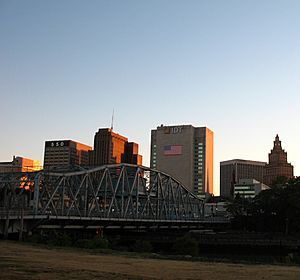
More than 100,000 people come to Newark for work every day. It's the biggest job center in New Jersey. Many jobs are in insurance, finance, healthcare, and government. Newark also has many college students, with nearly 50,000 attending its universities. The city's airport, port, and train systems make it a very busy shipping hub on the East Coast.
Newark still has many factories and light manufacturing. For example, a large Anheuser-Busch brewery opened in 1951. The service industry is also growing fast. Transportation is a big business, creating over 17,000 jobs in 2011.
Newark is the third-largest insurance center in the U.S. Prudential Financial started here and still has its main office in Newark. Other companies like IDT Corporation and NJ Transit are also based in the city.
Since the 1990s, there has been a lot of investment in downtown Newark. This has helped the city grow. Some parts of Newark are in an "Urban Enterprise Zone." This means shoppers can pay a lower sales tax of 3.3125% at certain stores.
Technology and Innovation in Newark
Newark's technology industry has grown a lot. Audible, an online audiobook company, moved its headquarters to Newark in 2007. Panasonic also moved its North American headquarters here in 2013. Other tech companies have followed.
In 2015, AeroFarms, which uses special technology for farming, moved to Newark. By 2016, it built the world's largest vertical farm in a Newark warehouse. This company uses data science to grow food.
Newark was even considered as a location for Amazon HQ2, a new Amazon headquarters. The city has many advantages for tech companies. These include being close to New York City, lower land costs, and many skilled workers. Newark also has a major airport and excellent fiber optic networks. These networks were built in the 1990s for data transfer.
The growth of tech companies has created a good environment for startups. Newark Venture Partners helps new tech companies get started. VentureLink@NJIT is the state's largest startup incubator. It helps new businesses grow.
Port Newark: A Busy Hub
Port Newark is a big part of the Port Newark-Elizabeth Marine Terminal. It's the largest cargo facility in the Port of New York and New Jersey. This port is where many goods enter and leave the New York metropolitan area. In 2003, the port handled over $100 billion in goods. There are plans to make the port even better with bigger cranes and deeper channels.
Arts and Culture in Newark
Amazing Architecture
Newark has many beautiful buildings. Some are in the Beaux-Arts style, like The Newark Museum of Art and the Newark Public Library. There are also Art Deco skyscrapers from the 1930s. The Cathedral of the Sacred Heart is a huge Gothic church. It has many stained glass windows. Newark Symphony Hall is a Moorish Revival building.
Live Performances and Music
The New Jersey Performing Arts Center (NJPAC) opened in 1997. It is home to the New Jersey Symphony Orchestra. NJPAC hosts many music, dance, and theater shows. It is one of the largest performing arts centers in the U.S.
Before NJPAC, Newark Symphony Hall was the main place for performances. This beautiful building, built in 1925, still hosts concerts today. The Newark Boys Chorus, started in 1966, also performs often in the city.
The Prudential Center opened in 2007. It's a big arena that hosts concerts by famous artists. Many popular musicians have performed there. Newark is also known for its unique house music and garage house styles.
Museums, Libraries, and Art
The Newark Museum of Art is the largest museum in New Jersey. It has amazing collections of American and Tibetan art. The museum also has science exhibits, a planetarium, and a children's gallery. You can also visit the historic John Ballantine House there.
The New Jersey Historical Society has exhibits about New Jersey's past. The Newark Public Library has eight locations. It holds over a million books and often has interesting exhibits.
Since 1962, Newark has been home to the Institute of Jazz Studies. This is one of the world's best places for jazz history. It has many jazz recordings, books, and interviews.
The Jewish Museum of New Jersey opened in 2007. It shares the cultural history of Jewish people in New Jersey. It's located in Ahavas Sholom, the last active synagogue in Newark.
Newark also has many art galleries. These include the Paul Robeson Galleries and Gallery Aferro.
Public Art and Murals
Newark has several public artworks by Mount Rushmore sculptor Gutzon Borglum. These include Seated Lincoln and Wars of America.
Since 2009, the city has supported Newark Murals. Many outdoor murals have been created, showing important people and events in the city. The "Portraits" mural, created in 2016, is one of the longest murals on the East Coast. It stretches for over a mile along the train tracks.
Festivals and Parades
Newark hosts many fun festivals and parades each year.
- The Cherry Blossom Festival happens in April at Branch Brook Park.
- The Lincoln Park Music Festival is in July at Lincoln Park.
- The Afro Beat Fest is also in July at Military Park.
- The James Moody Jazz Festival is a week-long event in November.
- The Portugal Day Festival takes place in June in the Ironbound area.
- Our Lady of Mt. Carmel in the Ironbound has an annual Italian Street Festival in July.
Newark also has several film festivals. The Newark Black Film Festival has been held since 1974. The Newark International Film Festival started in 2015.
Parks and Fun in Newark
Historic City Parks
- Military Park is in Downtown Newark. It has the Wars of America sculpture. This park is now managed by a private group that adds programs and events.
- Lincoln Park is in the Arts District. It's one of Newark's oldest parks.
- Harriet Tubman Square is another historic park. It has a statue of George Washington.
Riverfront Fun
- Riverfront Park runs along the Passaic River. It has a boardwalk and paths with great views of the water.
County Parks for Everyone
Several parks in Newark are part of the Essex County Park System.
- Branch Brook Park is famous for its annual Cherry Blossom Festival. It's the oldest county park in the U.S. and has over 5,000 cherry blossom trees.
- Independence Park is in the Ironbound district.
- Weequahic Park has an 80-acre lake. It was also designed by the same firm that designed Branch Brook Park.
- West Side Park is a 30-acre park in the West Side neighborhood.
City Parks and Green Spaces
- Peter Francisco Park is the entrance to the Ironbound area.
- Jesse Allen Park is in the Central Ward. It's Newark's second-largest city park.
- The Greater Newark Conservancy teaches about urban farming and gardening. It has a learning center and a small pond.
- Mulberry Commons is a park near the Prudential Center and Penn Station.
- Nat Turner Park is Newark's largest city-owned park. It was opened in 2009.
Sports and Recreation Facilities
- Weequahic Golf Course is an 18-hole public golf course. It's known as a "hidden gem."
- Jesse Allen Skateboard Park is a place for skateboarding.
Media and Entertainment in Newark
Newark is part of the big New York media market.
Newspapers and News Online
New Jersey's main newspaper, The Star-Ledger, is based in Newark. There are also online news sites like TAP Into Newark and Newark Patch. The Newarker is a magazine about Newark's culture and history.
Radio Stations
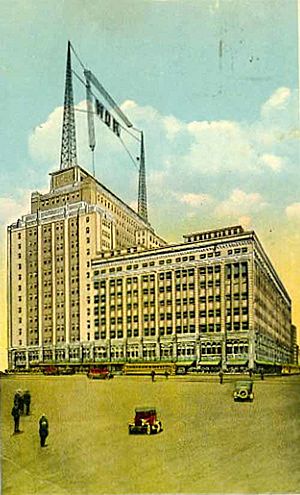
One of the first radio stations, WOR, started in Newark in 1922. It broadcast from a downtown department store. Today, that building is a big center for technology. WBGO is a radio station that plays jazz music.
Television and Film
New Jersey's first TV station, WATV Channel 13, started in Newark in 1948. WNET, a public broadcasting station, is now based in Newark.
Newark has a growing film industry. The city created the Newark Office of Film and Television to help movies and TV shows be made here. Many films and TV series have been shot in Newark. The city's old buildings and streets make it a great place for filming.
Some movies filmed in Newark include Joker and Smile. The TV series The Sopranos also filmed many scenes in Newark. A prequel to The Sopranos, The Many Saints of Newark, is set in the city.
Newark is getting a major new film and TV studio called Lionsgate Newark Studios. It is expected to open in 2024.
Theaters for Movies and Shows
Newark used to have many theaters in the early 1900s. Today, the CityPlex 12 Newark is the only movie theater still open in the city. The New Jersey Performing Arts Center and Newark Symphony Hall are still active for live shows and concerts.
Sports in Newark
Newark has been home to many sports teams. Currently, the city has one major professional team: the New Jersey Devils ice hockey team.
The Prudential Center is a large indoor arena in downtown Newark. It opened in 2007 and is known as "The Rock." It is the home of the Devils and the Seton Hall Pirates men's basketball team.
Newark also used to have a baseball stadium called Bears & Eagles Riverfront Stadium. It was home to the Newark Bears minor league baseball team. The stadium closed in 2014 and was later taken down.
| Club | Sport | Established | League | Venue |
|---|---|---|---|---|
| New Jersey Devils | Ice hockey | 1974 | NHL | Prudential Center |
| New York Sirens | Ice hockey | 2023 | PWHL | Prudential Center |
| Seton Hall Pirates | Basketball | 1908–1909 | NCAA Big East | Prudential Center |
| Jersey Express | Basketball | 2005 | ABA | YMCA of Newark and Vicinity |
The New Jersey Nets basketball team played at the Prudential Center for two seasons. The New York Liberty women's basketball team also played there for three seasons. The arena has hosted big events like the 2012 Stanley Cup Finals.
Learning and Education in Newark
Colleges and Universities
Newark has many colleges and universities. These include:
- Rutgers University–Newark
- New Jersey Institute of Technology (NJIT)
- Essex County College
- Seton Hall University School of Law
- Pillar College
Most of these schools are in an area called University Heights. The schools work together to help improve the area. They serve over 60,000 students and teachers.
Public Schools in Newark
The Newark Public Schools district is the largest school system in New Jersey. It has 65 schools and over 40,000 students. The state helps pay for school building projects in Newark.
Some high schools in Newark are highly rated. Science Park High School and Technology High School are examples.
Newark also has several charter schools. These are public schools that operate independently. Robert Treat Academy Charter School and Gray Charter School have won awards for being excellent schools.
Private Schools in Newark
Newark has two Catholic high schools.
- Saint Benedict's Preparatory School is a Roman Catholic school for grades K-12. It was founded in 1868.
- Saint Vincent Academy is an all-girls Roman Catholic high school. It has been operating since 1869.
Other private schools include Link Community School and The Newark Boys Chorus School.
Getting Around Newark

Newark is a major center for travel. It has a big airport, roads, trains, and a port. This makes it an important gateway to the New York metropolitan area.
Newark Liberty International Airport is the second busiest airport in the New York area. It opened in 1928. Port Newark is the largest container port on the East Coast.
Roads and Highways
Newark has many major highways. These include the New Jersey Turnpike (I-95), I-280, and Interstate 78. The Pulaski Skyway connects Newark to the Holland Tunnel and Lower Manhattan.
Many streets in Newark are named after the towns they lead to. Examples are South Orange Avenue and Springfield Avenue.
Public Transportation
Newark Penn Station is the city's main train station. You can catch the PATH train to Jersey City and Manhattan from here. It also has NJ Transit Rail Operations commuter trains and Amtrak intercity trains.
The Newark Broad Street Station is another train station. The two stations are connected by the Newark Light Rail system. This light rail also goes to northern Newark and nearby towns. It runs underground in downtown Newark. The Newark Liberty International Airport Station connects the airport to the train system.
NJ Transit provides bus service throughout Newark. Many bus routes connect different parts of the city and go to other towns.
Health and Safety in Newark
Newark has five hospitals. University Hospital is a teaching hospital and a major trauma center. Newark Beth Israel Medical Center is the largest hospital in the city. It also has the Children's Hospital of New Jersey.
In recent years, there have been concerns about lead in the drinking water in some areas. The city has been working to replace old lead pipes. They have also provided filters and bottled water to affected families.
Newark's Global Connections
Newark has several consulates from other countries. These include the Consulate-General of Ecuador and the Consulate-General of Portugal.
Pope John Paul II visited Newark in 1995. The Dalai Lama also visited in 2011 for a peace summit.
Sister Cities Around the World
Newark has many sister cities around the world. These are cities that partner with Newark to share culture and ideas. Some of Newark's sister cities include:
- Aveiro, Portugal
- Banjul, Gambia
- Belo Horizonte, Brazil
- Douala, Cameroon
- Freeport, Bahamas
- Ganja, Azerbaijan
- Kumasi, Ghana
- Monrovia, Liberia
- Porto Alegre, Brazil
- Rio de Janeiro, Brazil
- Seia, Portugal
- Xuzhou, China
Notable people
See also
 In Spanish: Newark (Nueva Jersey) para niños
In Spanish: Newark (Nueva Jersey) para niños
 | Leon Lynch |
 | Milton P. Webster |
 | Ferdinand Smith |






